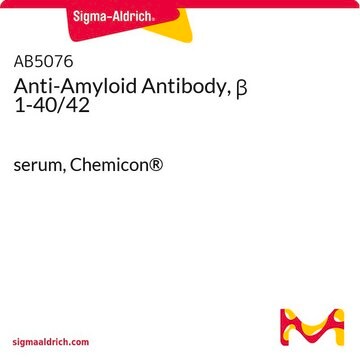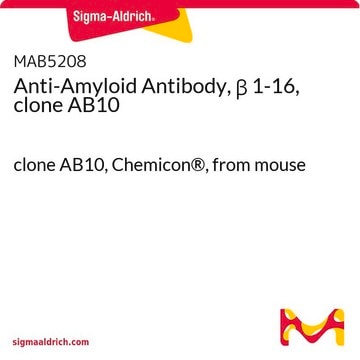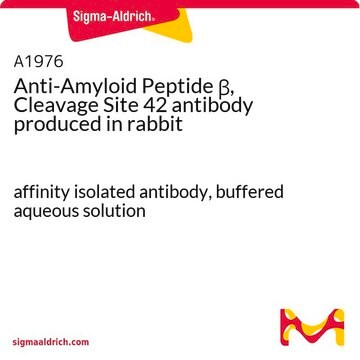MAB5206
Anti-Beta (β)-Amyloid antibody
CHEMICON®, mouse monoclonal, DE2
Synonym(s):
Anti-AAA, Anti-ABETA, Anti-ABPP, Anti-AD1, Anti-APPI, Anti-CTFgamma, Anti-CVAP, Anti-PN-II, Anti-PN2, Anti-alpha-sAPP, Anti-preA4
About This Item
Recommended Products
Product Name
Anti-Amyloid Antibody, β 1-16, clone DE2, culture supernatant, clone DE2, Chemicon®
biological source
mouse
Quality Level
antibody form
culture supernatant
antibody product type
primary antibodies
clone
DE2, monoclonal
species reactivity
monkey, bovine, human
manufacturer/tradename
Chemicon®
technique(s)
ELISA: suitable
immunohistochemistry: suitable (paraffin)
western blot: suitable
isotype
IgG
NCBI accession no.
UniProt accession no.
shipped in
dry ice
target post-translational modification
unmodified
Gene Information
human ... APP(351)
Application
Optimal working dilutions must be determined by end user.
Physical form
Legal Information
Not finding the right product?
Try our Product Selector Tool.
Storage Class Code
10 - Combustible liquids
WGK
WGK 1
Certificates of Analysis (COA)
Search for Certificates of Analysis (COA) by entering the products Lot/Batch Number. Lot and Batch Numbers can be found on a product’s label following the words ‘Lot’ or ‘Batch’.
Already Own This Product?
Find documentation for the products that you have recently purchased in the Document Library.
Our team of scientists has experience in all areas of research including Life Science, Material Science, Chemical Synthesis, Chromatography, Analytical and many others.
Contact Technical Service






